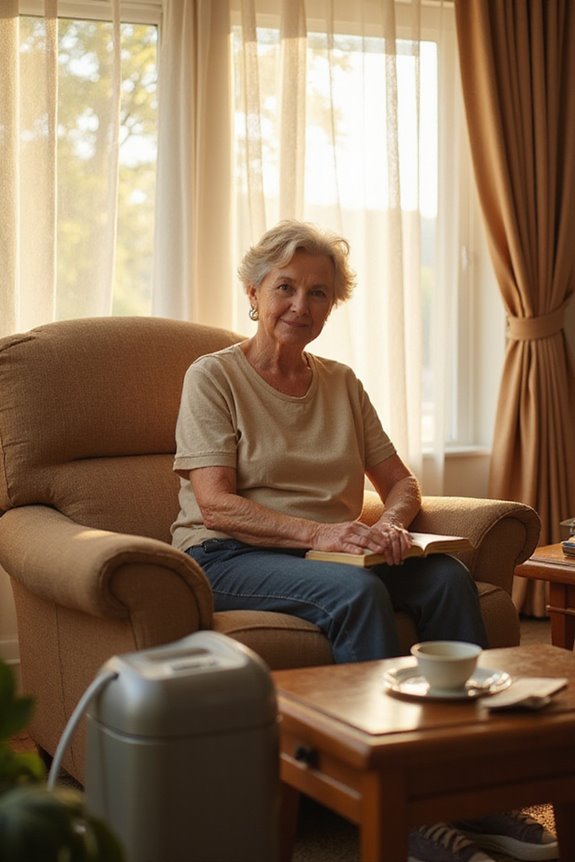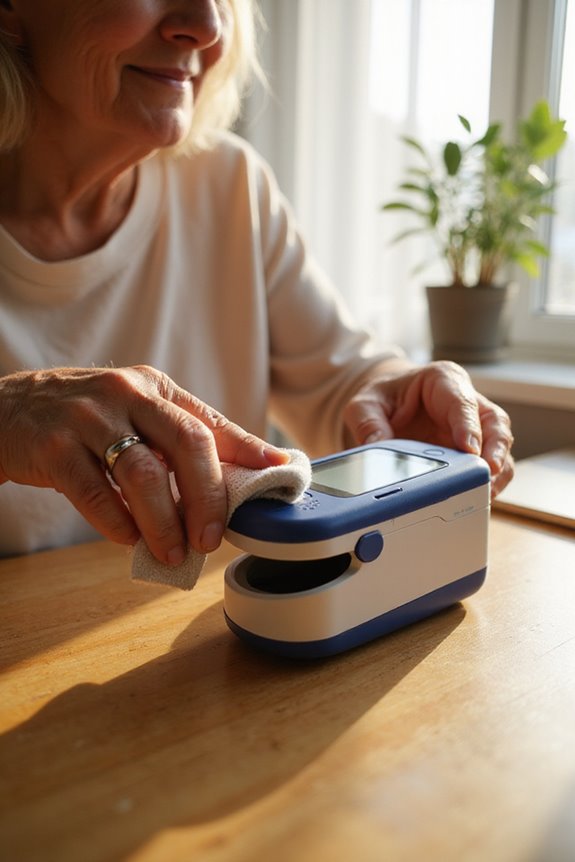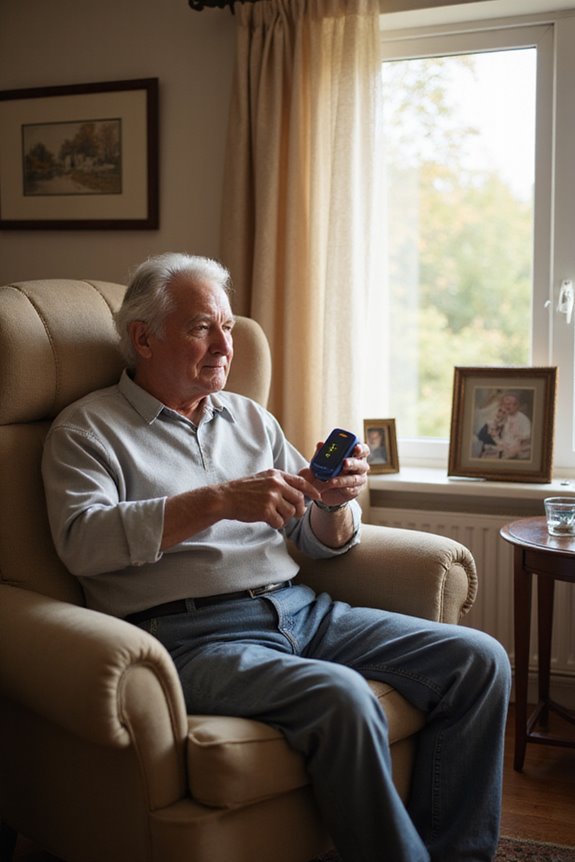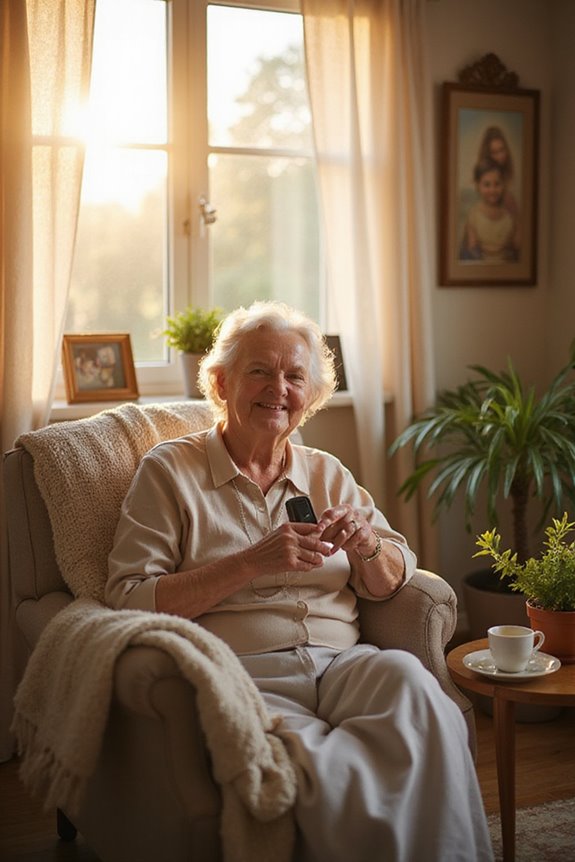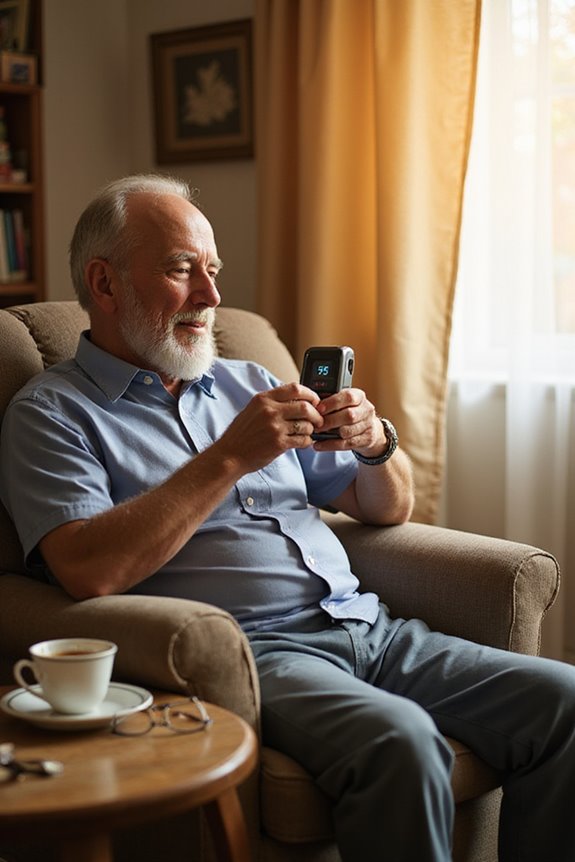Personal oxygen machines are available through various channels. These include medical supply stores, which offer renowned brands and expert guidance; online specialty retailers that provide diverse models; and manufacturer websites for direct purchases. General medical equipment distributors and pharmacies with durable medical equipment (DME) services also supply these devices. Regulations typically require a valid prescription. Key features and buying considerations are essential in making an informed decision. Further details on models and prices can enhance understanding.
Key Takeaways
- Purchase personal oxygen machines at medical supply stores that offer recognized brands and trained specialists for education on device use.
- Explore online specialty retailers for a diverse selection of models, detailed reviews, and competitive pricing.
- Visit manufacturer websites for direct purchases and comparisons of features from brands like Inogen and Philips Respironics.
- Check general medical equipment distributors for a broader selection and insurance support, requiring a physician’s prescription.
- Pharmacies with DME services can assist with equipment delivery and ongoing maintenance, handling insurance billing as well.
Medical Supply Stores
Medical supply stores serve as essential resources for individuals seeking personal oxygen machines. These establishments typically offer a wide range of portable and home oxygen concentrators suitable for varied oxygen therapy needs.
- Recognized brands such as CAIRE, Inogen, and Philips Respironics are commonly stocked.
- Trained respiratory specialists or patient service technicians provide education on device use and safety.
- Accessories, including tubing and cannulas, are readily available.
Many stores, accredited by organizations like ACHC and BBB, guarantee credibility. They often feature flexible customer service hours and offer both rental and purchase options. Additionally, many models offer adjustable flow rates to cater to individual oxygen requirements.
With nationwide distribution, these medical supply stores enhance accessibility, allowing for in-person consultations or home delivery, effectively supporting patients throughout their oxygen therapy journey.
Online Specialty Retailers
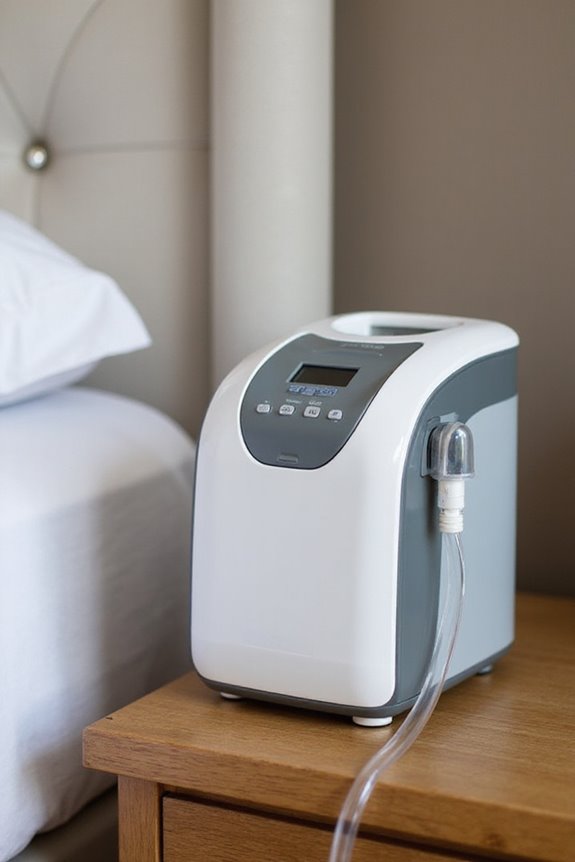
Online specialty retailers provide a convenient alternative for individuals seeking personal oxygen machines. These platforms, such as Oxygen Concentrator Store and Apria Home, offer a diverse selection of models from recognized brands, including Inogen and Philips Respironics.
Key Features:
- Wide variety of brands and models.
- Detailed online reviews aid in informed purchasing decisions.
- Prescription-required models guarantee compliance with medical regulations.
Shipping Options:
- Many retailers provide shipping to various locations, enhancing accessibility.
- Competitive pricing often accompanies efficient delivery services.
Online specialty retailers not only facilitate ease of comparison but also provide customer support during the buying process. This combination of choice and convenience makes them a valuable resource for those in need of personal oxygen solutions, particularly with the availability of lightweight options that enhance portability for users.
Manufacturer Websites
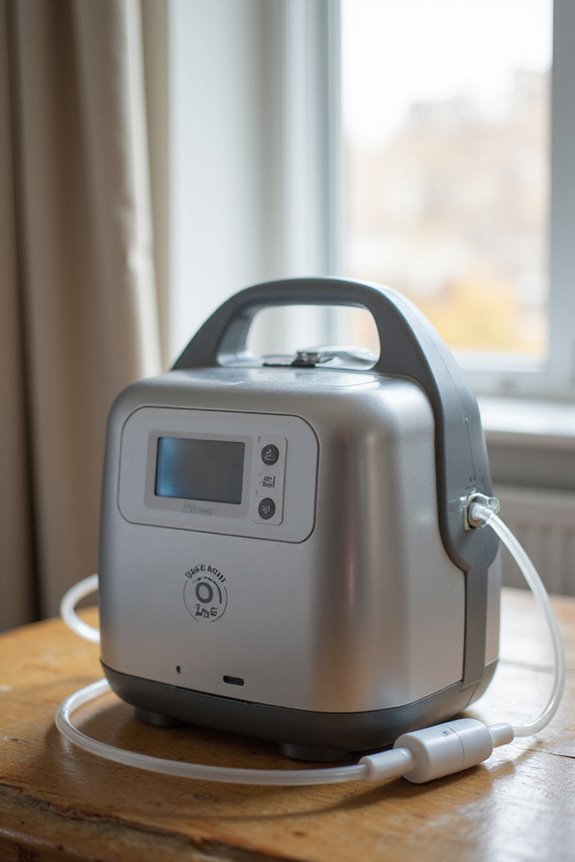
Manufacturer websites serve as a primary resource for purchasing personal oxygen machines directly from the companies that design and produce them. These platforms offer valuable insights through manufacturer comparisons, enabling customers to assess various models.
Key Features of Manufacturer Websites:
- Nidek Medical Products: Emphasizes high-quality exports and global presence.
- Inogen: Focuses on mobility with portable concentrators.
- CAIRE: Highlights diverse home oxygen solutions.
- Philips Respironics: Stresses ease of use and reliability.
- Drive DeVilbiss: Prioritizes quiet operation and broad flow range.
Customers can explore product specifications, customer support options, and innovative features directly on these websites, fostering a sense of community and informed decision-making in their oxygen therapy journey.
General Medical Equipment Distributors
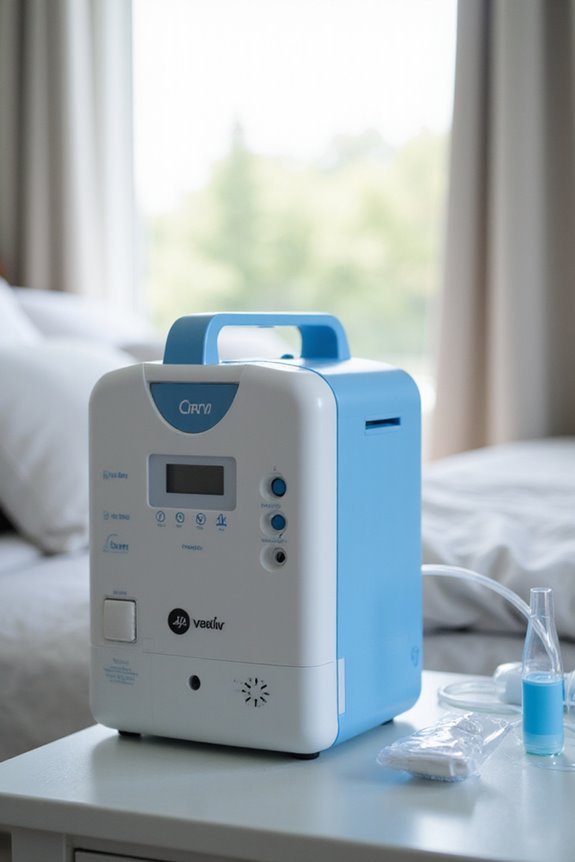
Personal oxygen machines can also be obtained through general medical equipment distributors, which provide a broader selection of oxygen therapy devices. These distributors offer a range of products designed to enhance patient lifestyle, including:
- Portable oxygen concentrators and stationary units, with flow rates from 0.5 to 10 liters per minute.
- Accessories such as oxygen supply tubing and humidifier bottles.
- User-friendly pulse oximeters in both pediatric and adult models.
Many well-known brands, including Drive DeVilbiss and Inogen, are available. Distributors typically require a physician’s prescription for purchases and may work with over 50 insurance providers, including Medicare. Customer service support is often provided to assist patients in selecting suitable equipment tailored to their specific medical needs. Additionally, many portable oxygen concentrators offer adjustable flow rates to cater to individual patient requirements.
Pharmacies With DME Services
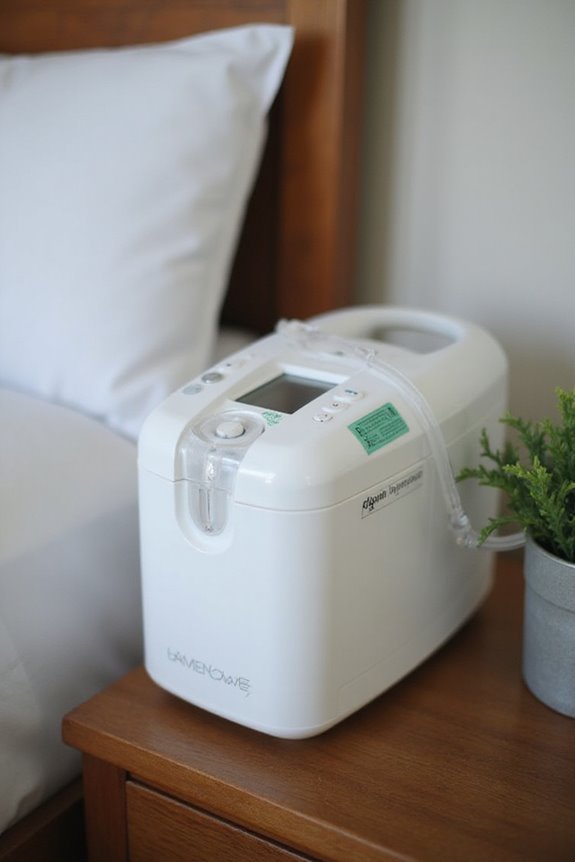
Pharmacies that offer Durable Medical Equipment (DME) services provide essential support for patients requiring oxygen therapy and related devices. When considering pharmacy selection for DME services, factors such as equipment variety and insurance coverage should be prioritized.
Key Offerings:
- Oxygen concentrators and portable oxygen systems
- Nebulizers and hospital beds
- Manual and powered wheelchairs
Insurance Handling:
- Billing Medicare and other insurers
- Verification of coverage and prior authorization as needed
Prescription and Documentation:
- Detailed medical prescriptions required
- Assistance with necessary documentation
Customer Support:
- Equipment delivery and setup
- Ongoing maintenance and troubleshooting assistance
Choosing a pharmacy with robust DME services guarantees thorough care and access to necessary equipment. Additionally, many pharmacies also offer insurance coverage verification to help ensure that patients receive the support they need without unexpected costs.
Price Ranges for Personal Oxygen Machines
Understanding the price ranges for personal oxygen machines is essential for consumers evaluating their options. The general price range for oxygen concentrators varies greatly:
- Portable Concentrators: $1,500 to $4,000.
- Home Concentrators: $650 to $2,500.
- Used Concentrators: $400 to $2,000.
- Rental Costs: $85 to $450+ per week.
Several factors influence these prices, including the type of system, battery life, weight, oxygen output, and brand reputation. For effective budget planning, consumers should consider price comparison across different models and types. Regional pricing can also vary, impacting overall costs. Exploring options such as refurbished models or rental services may provide additional flexibility in meeting individual needs. Additionally, evaluating the maintenance requirements of different concentrators can help ensure long-term satisfaction and performance.
Key Brands and Models to Consider
Choosing the right oxygen concentrator requires careful consideration of key brands and models available in the market.
Inogen Portable Oxygen Concentrators
– Inogen Rove 6: Higher oxygen output, 12-hour battery life, 37 dB noise level, FAA approved, pulse dose only.
Oxlife Liberty 2 Features
– Delivers both pulse dose and continuous flow, up to 2 LPM, FAA approved, larger and heavier for versatility.
Popular Models
- Inogen One G3, G4; Invacare Platinum Mobile; Respironics SimplyGo; SeQual Eclipse 5.
- Variations in dose volumes, continuous flow capabilities, and portability.
Home Concentrators
– Invacare Perfecto2 (0.5-5 LPM) and Platinum 10-Liter (2-10 LPM) models provide reliability with a 3-year warranty.
Brand comparisons highlight specific model specifications, ensuring informed decisions tailored to individual needs.
Important Buying Considerations
When evaluating personal oxygen machines, several important buying considerations must be taken into account to confirm the selected device meets individual needs.
- Flow Settings: Consider the flow rate, typically ranging from 3 to 10 LPM, with options for continuous and pulse dose. Adjustable flowmeters can cater to pediatric users.
- Battery Life: Essential for travel, users should assess battery options, including devices that allow for extended use with additional batteries.
- Weight and Portability: Lightweight models, such as the Inogen One G5, enhance mobility, which is critical for users with mobility challenges.
- Clinical Fit: Testing with a pulse oximeter ensures the device meets oxygenation needs across various activities. Additionally, understanding the battery life ranges of different models can help users choose the right device for their lifestyle.
These factors collectively inform a thorough evaluation of personal oxygen machines.
Purchase Process and Documentation Requirements
The purchase process for a personal oxygen machine involves several critical steps, necessitating appropriate documentation to confirm compliance with medical and regulatory standards.
- Prescription Requirement: A valid prescription from a licensed healthcare provider is mandatory, detailing oxygen flow rates, frequency, and duration of use. This assures safety and suitability for individual needs.
- Medical Necessity Documentation: Insurance coverage, including Medicare, requires documentation confirming medical necessity, typically through a Certificate of Medical Necessity (CMN) or detailed written orders (DWO). Proper sequencing of paperwork is essential to avoid claim denials.
- Supplier Selection: Purchase from certified suppliers who verify prescription details, offer FDA-approved machines, and provide guidance on features. Many also offer payment plans to assist with the cost. Additionally, it is crucial to consider energy efficiency as a factor when selecting a personal oxygen machine to ensure optimal performance and lower operational costs.
Frequently Asked Questions
Can I Use My Personal Oxygen Machine While Traveling Internationally?
Travel regulations for personal oxygen machines vary by international airlines. Users must guarantee their device is FAA-approved, meets airline policies, and adheres to battery requirements, while also preparing necessary documentation for a smooth travel experience.
What Is the Average Lifespan of a Personal Oxygen Machine?
The average lifespan of a personal oxygen machine can range considerably, often between three to ten years. Regular machine maintenance, including cleaning and filter replacement, plays an essential role in extending its longevity and reliability.
Are There Any Government Grants for Purchasing Oxygen Machines?
Government grants provide funding options for purchasing oxygen machines, often based on financial need or specific health conditions. Eligibility may include programs from Medicaid, Medicare, and various non-profit organizations dedicated to supporting individuals requiring oxygen therapy.
How Often Should I Service My Personal Oxygen Concentrator?
The recommended maintenance schedule for a personal oxygen concentrator includes regular checks and replacements. Service frequency typically entails monthly cleaning, quarterly inspections, and annual assessments, ensuring consistent performance and ideal user safety throughout its lifespan.
Can I Rent a Personal Oxygen Machine for Long-Term Use?
Long-term rentals of personal oxygen machines are available, offering flexibility for users. However, rental costs can accumulate over time, potentially exceeding the purchase price, making it essential to evaluate options carefully before committing.

